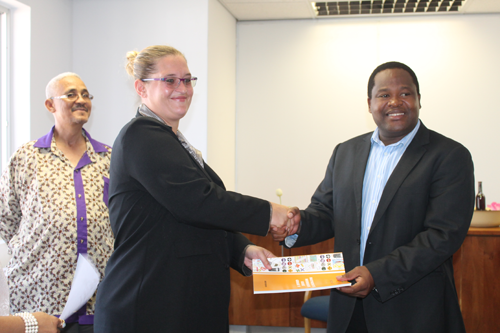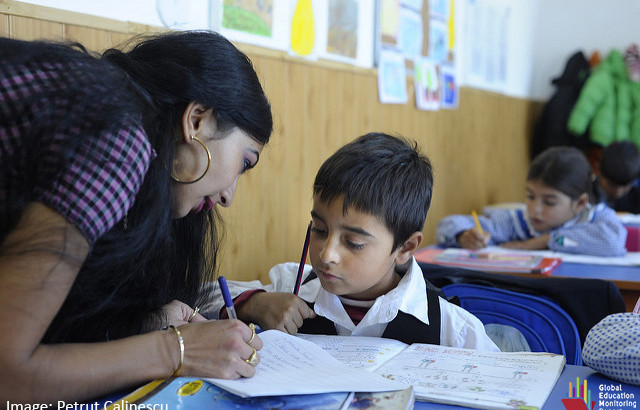8° Foro Internacional de Diálogo sobre Políticas – Equipo Internacional de Trabajo sobre Docentes Tema: Implementación de la Meta sobre Docentes en los Objetivos de Desarrollo Sostenible y el Marco de Acción para la Educación 2030 Declaración de México: Docentes por la Educación 2030
PREÁMBULO
1. Nosotros, los miembros y asociados del Equipo Internacional de Trabajo sobre Docentes, incluidos los decisores de políticas, profesionistas, investigadores y representantes de sindicatos de docentes, organizaciones de la sociedad civil, socios para el desarrollo, así como del sector privado de todas las regiones del mundo, nos reunimos en la Ciudad de México del 12 al 17 marzo de 2016, por invitación del Equipo Internacional de Trabajo sobre Docentes de la UNESCO y del Gobierno de los Estados Unidos Mexicanos para el 8° Foro de Diálogo sobre Políticas del Equipo Internacional de Trabajo sobre Docentes y sus Reuniones Anuales. Queremos agradecer al Gobierno de México y su población por haber sido sede de este importante evento.
2. Tomando nota del contexto mundial actual con la adopción de los Objetivos de Desarrollo Sostenible (en adelante ODS) y del Objetivo 4 del Marco de Acción para la Educación 2030, y siendo conscientes de las implicaciones para el avance de las sociedades sostenibles, revisamos las actividades actuales y futuras del Equipo Internacional de Trabajo sobre Docentes y debatimos sobre el tema y los subtemas del 8° Foro de Diálogo sobre Políticas.
3. Destacando el papel central de los docentes en los ODS y en el Objetivo 4 del Marco de Acción para la Educación 2030, deseamos reiterar nuestra posición manifestada tras la adopción de la Declaración de Incheon en mayo de 2015, cuyo Objetivo 4 busca “garantizar la calidad de la educación inclusiva y equitativa y promover oportunidades de aprendizaje permanente para todos”, que esta meta ambiciosa puede solamente ser alcanzada, si los sistemas educativos tienen como base una fuerza docente calificada y motivada. En consecuencia, queremos confirmar nuestro apoyo a un enfoque integral para la enseñanza y los docentes, y exhortar a la comunidad educativa global para que lleve a cabo su anhelo: “Velaremos por que los docentes y los educadores estén empoderados, sean debidamente contratados, reciban una buena formación, estén cualificados profesionalmente, motivados y apoyados dentro de sistemas que dispongan de recursos suficientes, que sean eficientes y que estén dirigidos de manera eficaz”.
Hemos adoptado las siguientes:
Recomendaciones para la Implementación del Objetivo 4
4. Reconociendo la labor del Equipo Internacional de Trabajo sobre Docentes y su capacidad de convocar a todas las partes involucradas, tales como gobiernos, organizaciones intergubernamentales, sindicatos de docentes, la comunidad de investigación, sociedad civil y el sector privado así como su ventaja comparativa en para abordar las políticas docentes de manera integral. Hacemos las siguientes recomendaciones:
4.1 Queremos convocar al Comité de Dirección del Objetivo 4 del Marco de Acción para la Educación 2030 para reconocer al Equipo Internacional de Trabajo sobre Docentes como el grupo técnico para la Meta Docente del Objetivo 4 e incluirlo como parte de su seguimiento.
4.2 Sobre la Formación Docente: reafirmamos que la formación docente inicial y continua, el apoyo y desarrollo profesional continuo, los marcos de calificaciones, los mecanismos de aprendizaje relevante y el aprovechamiento de las TIC y la educación a distancia, son vitales para cerrar las brechas en la provisión y calidad de los docentes, para lograr el ODS 4.
Específicamente para:
Fortalecer la calidad de los programas de formación docente, incluyendo la regulación de la formación inicial y la formación en servicio continua, con atención a la calidad de los formadores de docentes, los contenidos del currículo, las estrategias de desarrollo profesional, la evaluación de los logros de aprendizaje y teniendo en consideración los grupos sociales desfavorecidos.
Asegurar que las condiciones de acreditación y licenciamiento sean definidos claramente para el aseguramiento de la calidad, y regular la provisión pública y privada.
Basados en objetivos y resultados de aprendizaje claros, definir qué tecnologías podrían ser instrumentales para mejorar la formación docente y para enriquecer las prácticas pedagógicas.
Desarrollar estrategias educativas para el uso de las TIC en la formación docente y permitirles usar TIC en las prácticas docentes.
4.3. Sobre la enseñanza y el aprendizaje: reiteramos la necesidad de una mejor comprensión del proceso de aprendizaje y desarrollo de estrategias inclusivas y participativas viables para facilitar una enseñanza y aprendizaje más efectivos en formas que aseguren que todas las niñas, niños, adolescentes y adultos adquieran el conocimiento y las habilidades relevantes para su realización personal, para el empleo decente y para la vida. Reconocemos la necesidad de invertir en la enseñanza para mejorar los resultados de aprendizaje, con total reconocimiento a los contextos y a la participación de los docentes mismos.
Específicamente para:
Responder a las diversas necesidades de aprendizaje y preparar a los estudiantes para el aprendizaje a lo largo de la vida como base para la subsistencia decente y un desarrollo humano sostenible.
Promover acuerdos para la enseñanza y el aprendizaje, a través de investigación dirigida, adoptando diversas trayectorias de aprendizaje, asegurando la calidad y equidad, poniendo atención a los grupos vulnerables.
Promover estándares profesionales y certificación para los docentes, educadores, directores y administradores educacionales, considerando la inclusión de todos los estudiantes.
4.4. Sobre el financiamiento de la enseñanza y el desarrollo docente; enfatizamos que el logro de las metas del Objetivo 4 requiere financiamiento adecuado, sostenido, bien orientado, enfocado en la equidad, y planes para una implementación efectiva y eficaz, especialmente en los países menos adelantados y en situaciones de crisis. Afirmamos la necesidad de implementar apropiadamente opciones de política para llenar las brechas de financiamiento.
Específicamente para:
Contar con legislación y políticas docentes comprehensivas, ligadas a planes completamente costeados y financiados, ligados a los resultados, con foco en la calidad educativa, la equidad y la inclusión.
Emprender procesos apropiados y construir capacidades para asegurar una movilización y gestión de recursos más efectiva y eficiente, respetando los derechos y responsabilidades de la profesión docente.
Apoyar al Equipo Internacional de Trabajo sobre Docentes para involucrarse en el diálogo internacional sobre financiamiento de la educación, incluida la Comisión de Financiamiento de Oportunidades Globales de Educación y con la Plataforma para la Educación en Crisis y en Conflicto propuesta, para reforzar la necesidad de financiar enseñanza de calidad y desarrollo docente como una estrategia adecuada para el logro de los ODS.
4.5. Sobre monitoreo y evaluación del desarrollo docente: nos comprometemos a contribuir al monitoreo del Objetivo 4-c sobre docentes, adoptando la visión amplia del Marco de Acción para la Educación E2030 para asegurar que “los docentes y educadores están empoderados, adecuadamente reclutados, bien capacitados y profesionalmente calificados, motivados y apoyados”. Promovemos el establecimiento de estándares profesionales para directores y docentes.
Específicamente para:
Reportar de manera precisa los indicadores de la Educación 2030, mapear e integrar las bases de datos existentes sobre los docentes con el apoyo del Instituto de Estadísticas de la UNESCO y otros asociados, para fortalecer las capacidades nacionales para producir información robusta, que permita respuestas estratégicas a los problemas relativos a los docentes calificados y formados, el abandono y la retención, la distribución equitativa, y las condiciones de servicio.
Monitorear estrechamente y ayudar a diseminar los resultados de estudios que capturen aspectos intrínsecos y extrínsecos de la motivación docente, la cual es un componente relevante de la profesionalización.
Llegar a acuerdos sobre el marco y los instrumentos para el monitoreo de los docentes y los programas de evaluación de una manera participativa y asegurar que ellos tienen un enfoque formativo ligado al desarrollo profesional continuo, apoyados por liderazgo de calidad y por buena gobernanza.
Con base en lo anterior, el Foro exhorta al Equipo Internacional de Trabajo sobre Docentes para:
1. Reforzar su posición, como una alianza global para enfrentar retos relacionados con los docentes y la enseñanza, así como para el desarrollo de su plan estratégico post 2016, para responder a las necesidades de los docentes en el marco de la Agenda de los ODS.
2. Continuar con la producción y difusión de indicadores y conocimientos relevantes para las políticas, y el apoyo a los países para desarrollar e implementar políticas docentes basadas en evidencia, así como ofrecer oportunidades para el intercambio de conocimientos.
3. Instar a todos los miembros y socios para fortalecer sus acciones de una manera consultiva para alcanzar el la Meta Docente del Objetivo 4 y facilitar la alineación del trabajo de los miembros a nivel regional y nacional de los ODS.
4. Llamar a una mayor inversión en los docentes con recursos financieros internos como externos, incluidos aquellos provistos desde la perspectiva docente de la Comisión de Financiamiento de Oprotunidades Globales de Educación. 5. Contribuir al seguimiento del progreso en las diversas dimensiones de los docentes y de la profesión docente hacia el cumplimiento del Objetivo 4.
Declaración adoptada en la Ciudad de México, el 17 de marzo de 2016.
















 Users Today : 48
Users Today : 48 Total Users : 35460179
Total Users : 35460179 Views Today : 66
Views Today : 66 Total views : 3418849
Total views : 3418849